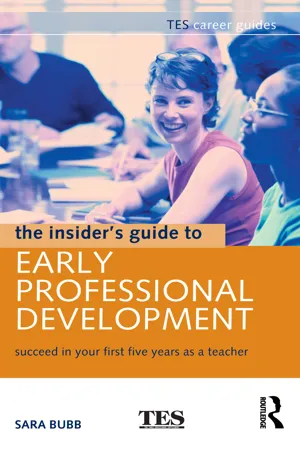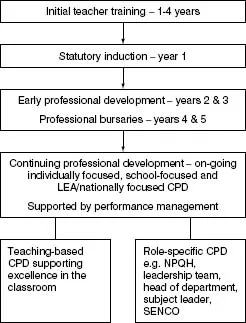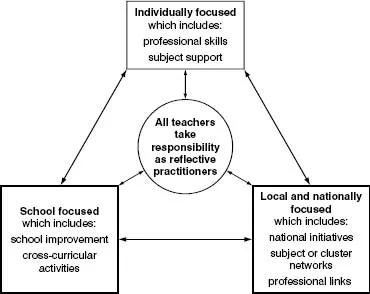
eBook - ePub
The Insider's Guide to Early Professional Development
Succeed in Your First Five Years as a Teacher
This is a test
- 192 pages
- English
- ePUB (mobile friendly)
- Available on iOS & Android
eBook - ePub
The Insider's Guide to Early Professional Development
Succeed in Your First Five Years as a Teacher
Book details
Book preview
Table of contents
Citations
About This Book
After training, it is common for teachers to feel adrift in the first few years - a fact reflected in the numbers who leave within the first few years. This book aims to address the factors that lead to this and is a source of advice for teachers on the first steps of the career ladder.
Frequently asked questions
At the moment all of our mobile-responsive ePub books are available to download via the app. Most of our PDFs are also available to download and we're working on making the final remaining ones downloadable now. Learn more here.
Both plans give you full access to the library and all of Perlego’s features. The only differences are the price and subscription period: With the annual plan you’ll save around 30% compared to 12 months on the monthly plan.
We are an online textbook subscription service, where you can get access to an entire online library for less than the price of a single book per month. With over 1 million books across 1000+ topics, we’ve got you covered! Learn more here.
Look out for the read-aloud symbol on your next book to see if you can listen to it. The read-aloud tool reads text aloud for you, highlighting the text as it is being read. You can pause it, speed it up and slow it down. Learn more here.
Yes, you can access The Insider's Guide to Early Professional Development by Sara Bubb in PDF and/or ePUB format, as well as other popular books in Education & Education General. We have over one million books available in our catalogue for you to explore.
Information
part one
Early professional
development
Early professional development is a fairly recent notion. The government EPD pilot funds were for teachers in their second and third years so many people think that EPD just covers this two-year period. But it makes more sense to me to use the concept of early professional development more widely to cover, say, the first five years. In your first year, when you complete your induction period, you should have intensive support, so this section focuses on what professional development there is for you when you're no longer labelled a newly qualified teacher – your second to fifth years.
The first chapter describes the elements and issues around professional development in general and EPD in particular. I give examples of what teachers in their fourth and fifth years have done with their professional bursaries. Then I focus on how to choose what to develop, how to do so – and how to evaluate what you've achieved.
The range of professional development activities is huge. The second chapter lists these and goes into more detail on how to learn from observing others, getting the most from going on courses and lastly about doing a masters degree – an increasingly popular option for many teachers.
one
Getting the most from
early professional
development
Professional development
Why is there a focus on early professional development?
The EPD pilots
Professional bursaries
Deciding what you want to develop
Recognising how you learn best
Drawing up action plans
Evaluating your development
Professional development
Professional development has been defined in various ways but the DfES, launching its strategy for professional development, calls it:‘any activity that increases the skills, knowledge or understanding of teachers, and their effectiveness in schools’ (DfES 2001a:3). It's everything that you do to improve and keep up to date, starting with your training and going on through your career, as illustrated in Figure 1.1. Your training provides the platform on which continuing professional development (CPD) is built. Aha, a new term! But what do we mean by CPD and is it different from staff development or in-service education and training – more commonly known as INSET? Broadly speaking, continuing professional development encompasses all formal and informal learning that enable individuals to improve their own practice. INSET and staff development are ways in which it can occur, but CPD is the big umbrella term to describe every aspect of your professional development.

Figure 1.1 Professional development throughout your career (Jones 2003, p.38)
CPD is a huge area. Ray Bolam (1993) makes a useful distinction between professional education, professional training and professional support.
- Professional education, e.g. long courses and secondments emphasising theory and research-based knowledge
- Professional training, e.g. short courses, workshops, conferences emphasising practical information and skills
- Professional support, e.g. activities that aim to develop on the job experience and performance
I like the way he distinguishes between training and education, because they're not always synonymous. Many courses that people have been on for the strategies for literacy, numeracy and Key Stage 3 give lots of information. You're not required to do much thinking or questioning – just take a great deal on board! Professional support is a crucial and everyday way to develop. You'll do that even when you're planning lessons or moderating work with another teacher.
England's General Teaching Council goes a bit further when it says that professional development should:‘recognise and seek to enhance teachers'sense of vocation, creativity and autonomy, and help to realise their career aspirations’. (GTC 2003b). Yes, we are people, not just ‘teaching machines’ as one teacher describes herself (Minnis 2003): people are always much more than the roles they play. I like the idea of my creativity and autonomy being enhanced – but it hasn't often happened. Creativity and autonomy are really about personal as well as professional development. Much has been written about the importance of emotional intelligence. We're judged by how well we handle ourselves, and each other.
So personal development does matter. Peter Earley (Earley and Bubb 2004) thinks that wherever possible the two should interact and complement each other. Waters (1998) uses the term ‘pro-personal’ development to indicate that when learning is most successful there are changes in self-awareness.
Teachers therefore need CPD opportunities in three areas (see Figure 1.2):
- Individually focused – these activities should focus on your own needs and career plans.
- School focused – activities in areas in which the school wants to make progress. These are usually identified in the school development plan and take place during the statutory INSET days and at staff meetings.
- National/LEA focused – activities that meet the demands of national and local initiatives.
Your responsibility
Professional learning and development is a responsibility throughout teachers’ careers, as can be seen in the Teachers’ Standards Framework (DfES 2001b). One of the standards that people have to meet in order to get qualified teacher status is that:

Figure 1.2 Continuing Professional Development Framework (Jones 2003, p.37)
They are able to improve their own teaching, by evaluating it, learning from the effective practice of others and from evidence. They are motivated and able to take increasing responsibility for their own professional development.
In order to pass induction teachers have to:
Show a commitment to their professional development by
- identifying areas in which they need to improve their professional knowledge, understanding and practice in order to teach more effectively in their current post, and
- with support, taking steps to address these needs.
The threshold standards require people to have ‘wider professional effectiveness’ and be able to demonstrate that they:
- take responsibility for their professional development and use the outcomes to improve their teaching and pupils’ learning, and
- make an active contribution to the policies and aspirations of the school.
Your entitlement
The General Teaching Council has drawn up an entitlement to professional learning within its Teachers’ Professional Learni...
Table of contents
- Front Cover
- The Insider's Guide to Early Professional Development
- TES Career Guides
- Title Page
- Copyright
- Contents
- Preface
- Acknowledgements
- List of abbreviations
- Part 1 Early professional development
- Part 2 Things that can help or hinder
- Part 3 Getting better …
- Part 4 Getting on
- References
- Index